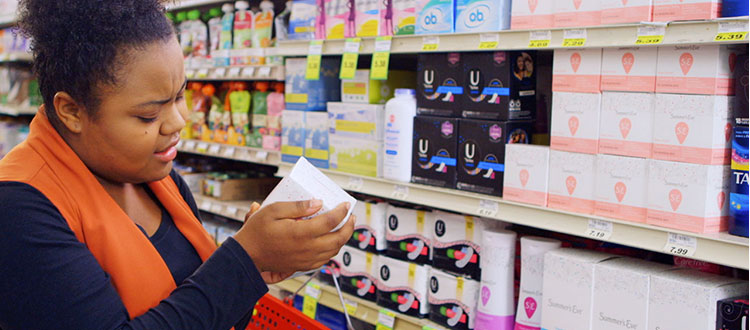How are Menstrual and Intimate Care Products Regulated?
This blog was supported by research conducted by Meghan Scott.
 Jamie McConnell Deputy Director |
Menstrual and intimate care products are used on and in some of the most sensitive body tissue, yet there is very little regulation over the safety of these products, and in many cases corporations are not even required to tell you what ingredients are used in these products.
Menstrual products (tampons, pads, menstrual cups) are regulated by the FDA as medical devices and intimate care products (douches, wipes, washes, sprays, powders) are regulated by the FDA as cosmetics.
Menstrual Products
Testing has found menstrual products can contain harmful chemicals like phthalates, dioxins, furans, parabens, triclosan, toluene, and more. Yet none of these ingredients appear on product labels—because they don’t have to. Nor does the Food and Drug Administration (FDA) require ingredients used in menstrual products to meet any kind of safety standard or ban the use of harmful ingredients from these products.
The Code of Federal Regulations Title 21, Subchapter H lists menstrual products like tampons, pads (including reusable pads), and menstrual cups as medical devices, but it does not include period underwear.[1]
There are some labeling requirements for tampons, but it does not include ingredient listings. Labeling requirements include warnings about toxic shock syndrome and absorbency information.[2] Tampons dispensed in vending machines are not required to meet any labeling requirements.
Manufacturers of menstrual products are required to file a pre-market notification submission (510 (k)) to the FDA that show the product is safe and effective. However, these notifications are not readily available. A Freedom of Information Act (FOIA) must be filed to obtain a 510 (k), and even then much of the information is redacted. Manufacturers do not have to submit a 510 (k) for menstrual pads if there is already an established safety profile for a “substantially equivalent” product.[3]
In 2019 legislation passed in New York state requiring the disclosure of all intentionally added ingredients in menstrual products, including period underwear. This is the first and only law in the nation to require disclosure of all intentionally added ingredients in menstrual products. Ingredients must appear on labels starting in October 2021. (READ MORE about this new disclosure law here.)
Intimate Care Products
Intimate care product like douches, wipes, sprays, washes, and powders are regulated as cosmetics under the Food, Drug, and Cosmetic Act. The section that regulates cosmetics hasn’t been updated in over 80 years and is only 1.5 pages long.
The FDA defines a cosmetic as a product used for “cleansing, beautifying, promoting attractiveness, or altering the appearance.”[4] In the US, cosmetic ingredients must be labeled on the product in descending order of prominence, except the ingredients listed in fragrance need only be listed on the label as “fragrance”. This is misleading and not informative for the user, because there can be dozens of ingredients that make up the fragrance in any given product.
Intimate care products can contain harmful chemicals like phthalates, parabens, formaldehyde releasers, and allergens like MI and CMI. There are no requirements for ingredients used in cosmetics to meet any kind of specific safety standard. That means ingredients known to cause or linked to cancer, birth defects, infertility, and neurological disorders, etc. are legally allowed to be used in cosmetics.
A new law in California, the Fragrance and Flavors Right to Know Act (SB 312), requires manufacturers to disclose harmful fragrance ingredients used in cosmetics to the California Safe Cosmetics Program. The information will then be made publicly available in a searchable database. Another recent law in California (AB 2762) bans 24 chemicals in cosmetics and personal care products that are already banned in the European Union. Quaternium-15, a formaldehyde releaser that can be found in intimate care products, is one of the chemicals the law bans.
Lubricants, another category of intimate care products, are regulated as medical devices under 21 CFR § 884.5300. Although this section of the law technically regulates lubricants, there is no language in it or the guidance for the section that specifically addresses lubricants. While lubricant manufacturers are required to submit a 510 (k), there is no guidance or instructions that must be followed, and there are no requirements for ingredient disclosure. This is concerning considering harmful chemicals can be found in lubricants, and the pH and osmolality of the product can interfere with the vaginal biome.
Solutions for Safer Products
People who menstruate or choose to use intimate care products deserve to have access to safe products and have the right to know what ingredients they are being exposed to. Not every person can afford a “green” tampon or pad that is 100% organic cotton. We need a system where no matter what store you buy your menstrual products from, or what brand they are, or how much the product costs, you can have the peace of mind of knowing exactly what ingredients you are being exposed to AND have the confidence that the product doesn’t contain ingredients that may harm your health.
- We need a federal law requiring the disclosure of all ingredients used in period products
- We need a federal law requiring all ingredients used in menstrual products to meet a standard of safety
- In absence of strong a law, companies, no matter what state the product is sold in, should disclose ALL ingredients.
The same goes for intimate care products. Ingredients used in these products should have to meet a standard of safety, and users have the right to know every ingredient in the product, whether it’s in fragrance or not. The underlying issue with intimate care products, though, is the advertising perpetuating the stigma that women’s bodies are dirty and smelly to drive sales of these unnecessary products.
- We need a strong federal cosmetic safety law that requires ingredients used in cosmetics and personal care products to meet a standard of safety
- We need a strong federal cosmetic safety law that requires the disclosure of ALL ingredients used in fragrance
Legislation is expected to be introduced in 2021 to require more disclosure and safety of these products. Sign up for our email list to stay updated on the latest news and actions.
—————————————-
[2] 21 C. F. R. § 801.430 (h)
[3] Menstrual Tampons and Pads: Information for Premarket Notification Submissions (510(k)s). U.S. Food & Drug Administration
[4] https://www.fda.gov/industry/regulated-products/cosmetics-overview



